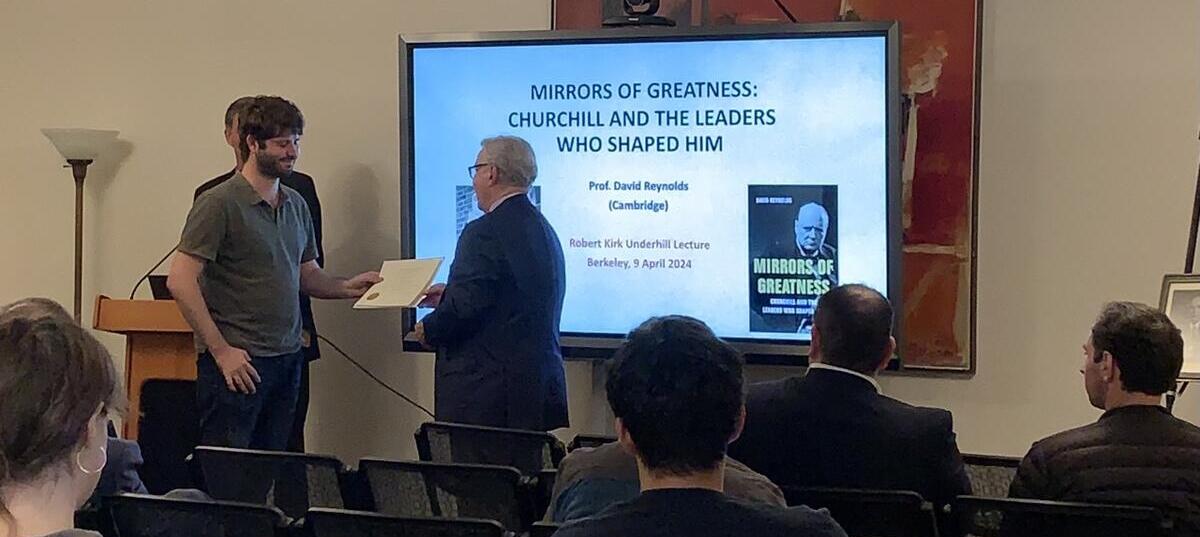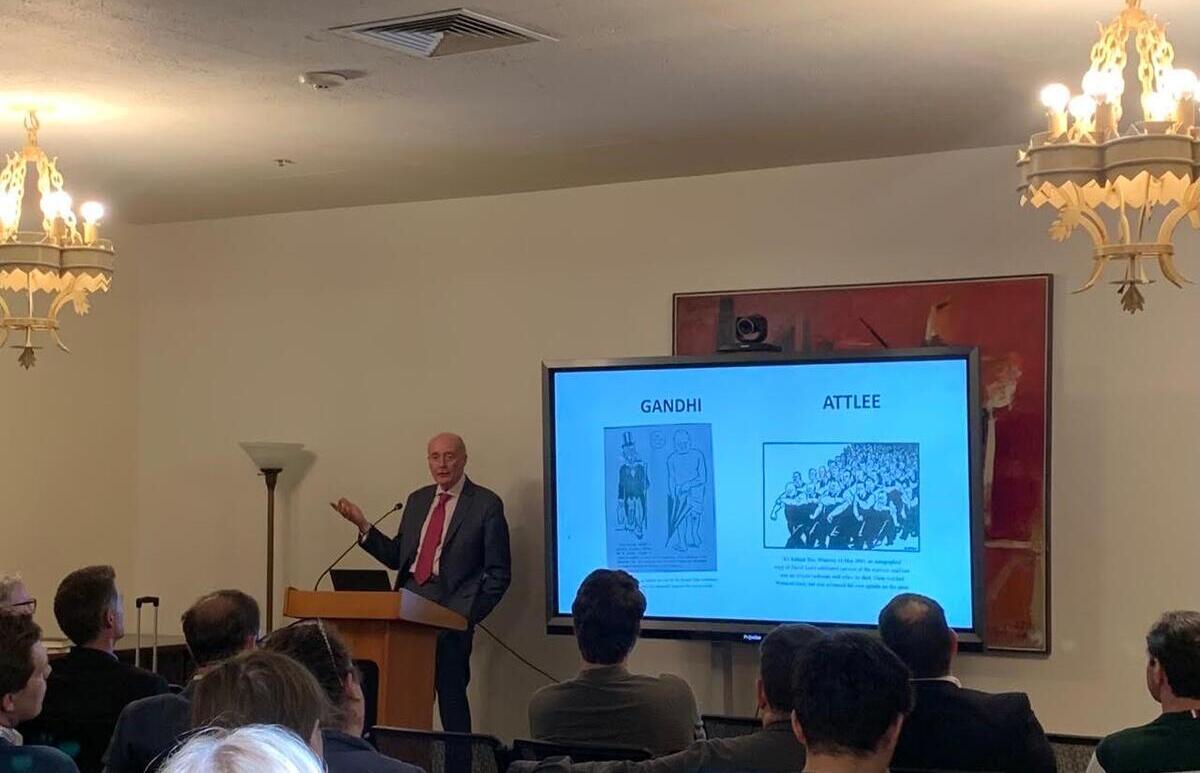On April 9th, the Institute of European Studies hosted 37 attendees for the annual Robert Kirk Underhill Lecture, followed by a Q&A session and a reception. This event was previously organized by the Anglo-American studies program, who joined IES in 2023, and was made possible by the Center for British Studies, Institute of International Studies, and Department of History. The Anglo-American Studies Program was created by the grace of Robert Kirk Underhill, the namesake of the lecture, who was an alumnus of UC Berkeley class of 1928, and passed in 2023.
At the start of the event, IES Director Jeroen Dewulf announced the recipients of 2024 undergraduate research fellowships in Anglo-American studies:. Matthew Kovac, History, Alex Yong Kang Chow, Geography, and Tak-Huen Chau, Political Science.
This year's speaker was David Reynolds, an Emeritus Professor of International History at Cambridge University’s Christ College. Professor Reynolds was introduced by Professor Jeroen Dewulf as an elected fellow of the British Academy in 2006 and the author of 14 books ranging across British us and European history, specifically noting "Island Stories: Britain and Its History in the Age of Brexit", and "Mirrors of Greatness: Churchill and the Leaders Who Shaped Him", the latter of which was the topic of this lecture with of audience of about 37.

Matthew Kovac receives the R. Kirk Underhill Graduate Fellowship in Anglo-American Studies
Reynolds began by arguing that Churchill is a figure who continues to live on in the public eye, fascinating the public and sparking debate and controversy in Britain. While he is usually discussed as a standalone character, praised for his genius and described as a man with a “jagged streak of lightning through the brain,” there is a danger of taking him out of his human and historical context. The idea behind “ Mirrors of Greatness’ is to think about Churchill in relation to the people he dealt with, including leaders who shaped his career, mentors, rivals, and those posing fundamental obstacles throughout his career. Reynolds noted that Churchill's career was shaped by those interactions no less than anyone else's, aiming to flesh out a three-dimensional figure.
The lecture began by introducing Churchill's relationship with his father, citing his lifetime friend, Violet Bonham Carter, who expressed that he “worshiped at the altar of his unknown father .” Reynolds noted that by building up his father, Churchill expedited his career, explaining that he potentially benefited from having his father as an idealized figure, as this was a driving factor in his motivation.

David Reynolds (Cambridge University) adresses the audience of the 2024 R. Kirk Underhill Lecture
A later section of the lecture, titled Allies and Rivals, introduced fellow English politicians David Llyod George and Neville Chamberlain as central figures in shaping Churchill's leadership, both being people with whom he collaborated but remained wary of. The subsequent sections of the lecture were split into time periods. Beginning in the 1920s, Reynolds introduced Churchill as a man of many talents, a painter, a bricklayer, and someone well established politically and socially.
Reynolds argued that in the 1930s, Churchill's reputation declined, and he was viewed as a man who was losing touch. He advocated for re-armament, something many saw as an attempt to attract attention. Reynolds noted the importance of his relationship with King Edward VIII in the same period surrounding the issue of abdication in Parliament. Summing up public perceptions, Reynolds shared Llyod George’s statement that Churchill’s "steering gear is too weak for his horsepower. ''. Contrarily, Chamberlain prided himself on attention to detail, which is in Reynolds's eyes a humorous irony considering his Churchillian flamboyance during appeasement.
Reynolds also discussed the importance of Churchill's view of Mussolini and Hitler. Reynolds argued that Churchill viewed Mussolini as a man of fallen greatness. Mussolini was a man Churchill greatly admired, possibly due to his sense of history and views of Italy as the descendant of classical Rome. For Churchill, Hitler was Germany, a recently united militaristic country he viewed quite poorly. Reynolds points to the idea that Churchill often did not seem to distinguish between the leaders and the country they represented. He uses the term “gangster” deliberately, referring to Churchill's belief that if Hitler was caught, he should have been subjected to an electric chair, as Americans did to gangsters. He suggests that perhaps, to Churchill, caricature of Mussolini was grossly unfair because Mussolini was a great man who had fallen, whereas Hitler should have never risen.
Next, Reynolds covered the period from 1940-1945, discussing Churchill's role as Prime Minister and War Leader, pointing to his genius in aiding the French a week into the war when French Premier Paul Reynaud already felt that France had been defeated. Here, Reynolds argued, one can see Churchill as a ‘bulldog,’ as he fought to engineer “victory at all costs,” as he stated to the House of Commons in 1940.
Reynolds also covered the crucial relationships Churchill formed with Roosevelt and Stalin. He argued that Churchill held a deep and unreciprocated admiration for Roosevelt due to his ability to inspire courage in the American people despite his paralytic illness. Reynolds expressed that although seemingly implausible, Churchill also held a regard for Stalin that stemmed from his belief that Stalin was a man he could do business with- someone straightforward. Reynolds quipped that although Churchill had never met Hitler, he got him on the nose, whereas he had met Stalin yet never could seem to get him right.
Reynolds expressed his desire to include a few people Churchill wouldn’t have expected to see in the book: Gandhi, Attlee, and his wife, Clementine. Importantly, he argued, that to Churchill, Gandhi was a threat to Britain and the empire and a challenge to his fundamental beliefs about manhood, civilization, and leadership. In this section, he also touched on important issues such as poverty, colonization, women in the workplace, and ever-changing views of both feminine and masculine gender roles.

David Reynolds (Cambridge University) stands in front of his presentation for the 2024 R. Kirk Underhill Lecture
In closing, Reynolds shared his thoughts on a passage from Churchill’s “Finest Hour” speech of 1940. “Let us therefore brace ourselves to our duty and so bear ourselves that if the British Commonwealth and Empire lasts for a thousand years men will still say, 'this was their finest hour.". Reynolds then stated that Churchill did not see how Britain and the British Empire could be disentangled, viewing the empire as a feature of Britain's continuing history that he did not want to let go of. In this light, he takes Churchill's famous quote from World War Two on utilizing beaches as ‘springboards rather than sofas’ and urges the audience to transpose that thinking to both Churchill's legacy and our understanding of British history overall. Heritage is a means of moving towards the future, not of languishing.
Overall, in this lecture, Reynolds explored Churchill through different characters he interacted with and different models of greatness to develop a more extensive understanding of what it meants to be a leader. He hopes that his book, “Mirrors of Greatness: Churchill and the leaders who shaped him” will have a greater meaning to those that read it than a simple examination of English history.
